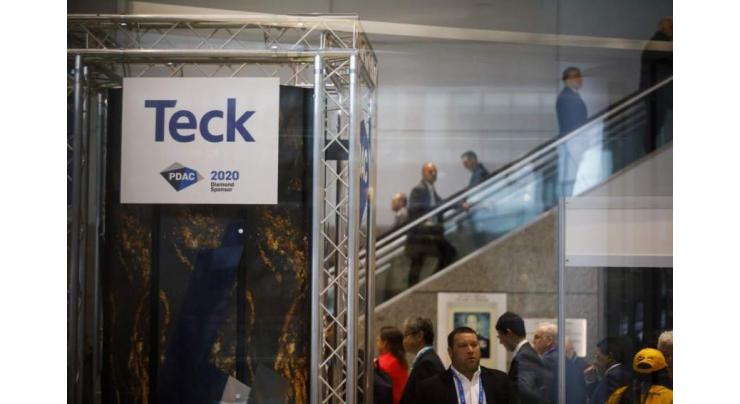
Canada's Teck Resources Cancels Breakup Vote
Mohammad Ali (@ChaudhryMAli88) Published April 26, 2023 | 11:54 PM

Canadian mining group Teck Resources at the last minute on Wednesday cancelled a shareholder vote on splitting its metals and coal operations into two companies, while continuing to push back against Swiss giant Glencore's takeover effort
Ottawa, (APP - UrduPoint / Pakistan Point News - 26th Apr, 2023 ) :Canadian mining group Teck Resources at the last minute on Wednesday cancelled a shareholder vote on splitting its metals and coal operations into two companies, while continuing to push back against Swiss giant Glencore's takeover effort.
The Vancouver-based company twice rejected hostile takeover bids by Glencore in recent weeks, urging shareholders to instead support its restructuring plans.
A yes vote would have effectively blocked Glencore's advances and brought an end to their clash over the future of Canada's largest diversified mining company.
But hours before the special meeting was to be held, Teck Resources said in a statement it "has determined not to proceed with the consideration by its shareholders" of its proposal to "reorganize Teck's business into two companies." The cancellation signaled a lack of confidence that Teck Resources would have secured the two-thirds support from shareholders necessary to approve its proposal.
Chief executive Jonathan Price said that Glencore's proposals "remain a non-starter" and vowed that Teck will continue pursuing an in-house solution.
"Our plan going forward is to pursue a simpler and more direct separation (of coal and metals operations), which is the best path to unlock the full value of Teck for our shareholders" and in line with the feedback of some shareholders, he said.
Glencore declined to comment on the vote cancellation.
In February, the Canadian group, which employs 11,000 people, proposed to spin off its activities in metallurgical or coking coal, used to produce steel, into a new company called Elk Valley Resources (EVR) that would be listed separately on the Toronto Stock Exchange.
Teck Resources would hold onto zinc and copper mines and become Teck Metals.
Metals have significant growth potential since they are in high demand for the transition to clean energy, the company has explained, even though coal accounted for much of its revenues.
- Glencore came knocking - In early April, Glencore presented an unsolicited offer valuing Teck Resources at more than US$22.5 billion, a more than 20 percent premium to its March 24 closing price.
Glencore proposed combining their activities and simultaneously carving them up to create a company specialized in metals called MetalsCo and another specialized in coal, called CoalCo.
But Teck warned that such a merger would bring Glencore's thermal coal into its business.
Used to produce electricity and heat, thermal coal is attracting much more criticism because of its CO2 emissions that contribute to climate change.
Glencore came back with an US$8.2 billion cash component hoping to woo Teck investors wary of exposure to thermal coal, but the offer was again rejected by Teck's board.
Teck Resources controlling shareholder Norman Keevil has remained steadfastly opposed to a merger, and Ottawa -- which would need to approve any foreign takeover -- has signalled its preference for the company to remain in Canadian hands.
"We need companies like Teck here in Canada -- companies with a strong commitment to Canada," several ministers led by Deputy Prime Minister Chrystia Freeland said in a letter to the Greater Vancouver Board of Trade obtained by AFP.
The company and its assets, they wrote, are "of central importance to our country as we expand our critical minerals value chain and build a clean economy." One of the top mining companies in Canada, Teck Resources produces coal, zinc and copper. Outside of Canada, the group is present in Peru, Chile and the United States.
Both Teck Resources and Glencore shares were up in early trading after the scuttled shareholder vote.
On Wednesday, Teck also reported a revenue decline of 18 percent in its first quarter to Can$3,8 billion (US$2,8 billion).
Related Topics
Recent Stories

Sharjah Animation Conference explores cross-cultural collaboration opportunities ..

Sharjah Public Library provides countless opportunities for young imaginations t ..

Sharjah Police launches 'Your belongings, your responsibility' awareness campaig ..

Dubai Police displays Innovative Tourism Security Services at 'ATM 2024'

Mohammad Haris, Aamir Jamal not part of national squad for Ireland, England: Bab ..

Erdogan opens former church to Muslim worshippers

Cultural events hallmark of a nation, Director RAC

Iraq hangs 11 convicted of 'terrorism': security, health sources

Stocks rise on renewed hopes of rate cuts

PM assures all-out support to Saudi investment

S.Africa building collapse traps 48 workers: city hall

Nilofar lauds efforts for development of national document aimed promoting balan ..
More Stories From World
-
UN experts slams Israel’s ‘sexual assault and violence’ against women, children in Gaza
7 minutes ago -
Merlier pips Milan to Giro third stage, bold Pogacar holds lead
27 minutes ago -

Sharjah Animation Conference explores cross-cultural collaboration opportunities, highlights new pro ..
31 minutes ago -

Sharjah Public Library provides countless opportunities for young imaginations to take flight at SCR ..
33 minutes ago -

Sharjah Police launches 'Your belongings, your responsibility' awareness campaign
33 minutes ago -

Dubai Police displays Innovative Tourism Security Services at 'ATM 2024'
33 minutes ago
-

Erdogan opens former church to Muslim worshippers
41 minutes ago -

Iraq hangs 11 convicted of 'terrorism': security, health sources
1 hour ago -

S.Africa building collapse traps 48 workers: city hall
60 minutes ago -

UN pledges to stand with Gazans amid reports Hamas has accepted ceasefire deal
60 minutes ago -

Germany says Gaza truce talks must not be 'jeopardised'
2 hours ago -

Military-ruled Chad votes for president in bloody transition
4 hours ago









